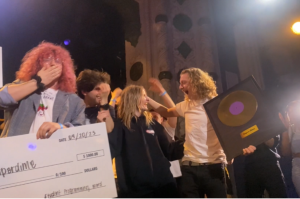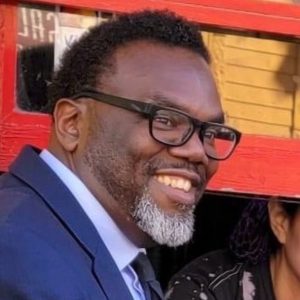Feb. 10, 2009 - Gloria Campos and her three-month-old son were the only members of her family to board the last Red Cross plane out of Nicaragua during the revolutionary war in July 1979.
Campos, then 21, was the daughter of a high-ranking government official, who also owned a cotton farm and electricity generators. Since her father worked for President Anastasio Somoza, there was a target on his back.
"All the guerrillas (Sandinistas) the people that were in the mountains were coming into the city of Managua. And of course they were happy because they were celebrating. I think that that was the only time in my life that I have learned and felt defeat. It was not pleasant," said Campos, now 51, who now lives in Murphysboro in southern Illinois.
Nicaraguans would engage in a civil war for the next 11 years. The FSLN left-wing guerrillas, known as the Sandinistas, came to power and they fought against the Contras supported by Somoza. The Somoza family had controlled the government from 1936 until the 1979 revolutionary war.
The Sandinistas, the socialist government, fought the U.S.- funded, anti-communist Contras during the Regan Administration. The Sandinistas were funded by the Soviets and Cubans and they stayed in power until 1990.
Campos is one of more than 61,000 refugees that have come from Latin American and Caribbean countries such as Nicaragua, Cuba, Haiti, El Salvador and Colombia since 1975, according to the U.S. State Department. In 2007, only 2,981 refugees were admitted into the United States from this region.
Campos recalled the day she left Nicaragua. She boarded a plane at the airport and her baby was sick with an E. coli infection. All she took with her was her passport, clothes and formula for her son. She hid $50 in her pocket so they guards wouldn't find it. "My purse was taken away," she said.
A guard also took a knife and opened the seal on a can of baby formula
"(He wanted) to check if I had money in there," Campos said.
Campos said when she was at the airport that people rushed to get into her plane, and that some of them were shot by the guerillas. "They were killing to get in there," Campos said. "There was a rush, someone said. Run! Run! Run! Get in there."
It was an unpressurized cargo plane. Campos said she was freezing, and she tried to keep her son warm by holding him close her body as they flew to Guatemala.
In Guatemala, she only had permission to stay for 30 days. Campos was married and her husband was studying in Mexico, where he was waiting for her. She tried to apply for a visa to go Mexico without success.
Campos said she stayed with family friends in Guatemala, and got a visa extension for another 30 days. She got in contact with an old family friend, whose father used to be a congressman and the Nicaraguan ambassador to Guatemala, and had still had diplomatic connections.
"I told him that I'm stuck. I cannot get into Mexico, because the Mexican government is not allowing any Nicaraguans to go across the border legally," Campos said.
Then she received a phone call in the middle of the night.
"Gloria don't ask questions, just go to the Mexican embassy," the voice said. "They will give you a visa so you can be reunited with you husband."
Campos said the next morning she took a taxi to the embassy, did not ask questions and said, "I'm Gloria Pereira Campos, they told me to come over here to get my visa."
Campos boarded a plane for Mexico that same afternoon where she reunited with her husband. He got a job as a chemical engineer for a sugar cane company.
They saved up enough money to plan a vacation to Carbondale, where her parents had settled when they fled Nicaragua. The family knew then Sen. Paul Simon who encouraged them to apply for political asylum, which they received.
Campos became a U.S. citizen in 1995 and now runs a small cleaning business. She also is active in Illinois Republican politics in Jackson County and is the Illinois chairperson and Midwest representative of the Republican National Hispanic Assembly, a political organization that promotes involvement of the Hispanic community.
Angel Garcia, the president of the Chicago assembly, has known Campos almost five years.
"You would think that someone who had to flee her country for political reasons would be adverse to political activism. Gloria does not retreat from politics. She engages the political arena. Gloria has been more active than native born citizens to the point that today she is the Midwest leader of a Hispanic political organization," Garcia said.
Vicenta "Vickey" Miller from southern Illinois is on the board of the Illinois Federation of Republican Women and has known Campos over 15 years. Miller has witnessed all of the hard work Campos has dedicated to politics during their many adventures traveling the state together. "What Gloria has to share is immensely important, people can learn from her life experiences especially the Hispanic community. Friends admire all her efforts and hard work she has dedicated to volunteering for this country, not only nationally, but also in her community. She is an outstanding speaker, and shares her talents and mentors others to become leaders," Miller said.
Campos added, "To the Latino community it is important for us to speak up. We have a voice. We don't need to whisper anymore. We can talk. We chose the United States to be our country. We have chosen the American flag to be our flag. We need to participate in the democratic process and embrace the concept that politics is in our lives daily."
Campos returned to Nicaragua to visit with her family for a theater dedication in León to her mother in January 2004.
"I saw the volcanoes and the lake, all green - the land of poetry, music and no army on the streets. I knew I was OK. It is a beautiful country but for many years we were a family with out a country, without a flag," Campos said.
Campos described her heart as triangular shaped like Nicaragua, but she said it is colored, red, white, and blue.
Categories:
Global Politics Public Social Issues
Tags:
illinois immigration refugees






Be First to Comment